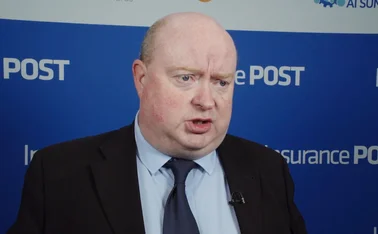
MoJ defends position on access to justice for children amid whiplash criticism

Exclusive: The Ministry of Justice has defended itself over a "loophole" in whiplash legislation that lawyers and trade bodies argue could leave the majority of children injured in road traffic accidents without access to compensation or representation.
Children are exempt from using the new whiplash claims portal for the time being. They are also exempt from the small track claims limit rise from £1000 to £5000.
The incoming system of tariffs means that a vast majority of children injured in RTAs will fall under the small track claims limit, meaning they will struggle to access legal representation and will not be able to use the old portal either, the Association of Consumer Support Organisations and others have cautioned.
The tariff for a soft tissue injury lasting under nine months is expected to be £805.
However, the Ministry of Justice has hit out at criticism from Acso and other bodies following Parliamentary under-secretary at the Ministry of Justice, Chris Philp’s response to a question on the reforms, and affirmed its commitment to working in the interests of children and vulnerable road users.
Acso and others had argued that it had embarked on unintentional “poor policy making”.
A MOJ spokesman told Post: “We strongly disagree with this interpretation as there are already robust measures in place to make sure children’s claims are supported.
“Our whiplash reforms will make claiming for personal injury simple, fair and proportionate, but we continue to look at ways the regime can be strengthened further in the interests of all claimants, including children and other vulnerable parties.”
The MOJ sees no fundamental reasons for compensation for claims to be different for children, vulnerable adults or others, Post understands.
Judicial discretion could come into play, which would potentially lead to a child being moved from the small claims track to the fast claims track, where costs are recoverable.
In most cases, it expects a child would be represented by a “litigation friend”, which could be a parent, rather than a legal representative.
Any settlement of a claim that involves a minor or vulnerable adult will have to be approved by a court, with legal advice on merits of any proposed settlement also required. This would be a recoverable cost, with current practice that an insurer would pay for this to be provided.
While children are currently exempted from the increase of the small track claims limit, this will enable the system to be assessed by non-vulnerable claimants before a long-term approach is reached, it is understood.
Philp’s response
In a question to the Ministry of Justice, Labour MP Ellie Reeves asked: “To ask the Secretary of State for Justice, what representations he has received on the provisions of the Civil Liability Act (2018) in relation to children and protected parties injured in road traffic accidents using the new claims portal; and if he will make a statement.”
Chris Philip MP, Parliamentary under-secretary at the Ministry of Justice, responded: “The applicability of the government’s whiplash reforms to both minors and other protected parties was debated by both Houses during the Parliamentary passage of the Civil Liability Act 2018.
“We have since received representations on this issue from the Motor Accident Solicitors Society, the Association of Personal Injury Lawyers and the Association of Consumer Support Organisations.
“As the government made clear during the parliamentary debates, we see no fundamental reason why the level of compensation to be paid to minors or other protected parties in the event of a road traffic accident minor injury claim should be different to that paid to another injured party. The government, therefore, intends that the tariff of fixed damages for whiplash injuries should apply to minors and protected parties.
“The government has since considered the separate issue of whether the proposed increase in the small claims limit for road traffic accident claims from £1000 to £5000 should apply to minors and protected parties. We have decided that, for the time being, they should be exempted from the increase in the limit and from the need to use the new online whiplash claims system, which is intended to accompany implementation of the whiplash system. This is to enable consideration of the experience of non-vulnerable claimants using the new online service under the new limit before considering the long-term approach for children and other vulnerable parties.
“All minors and other protected parties in civil proceedings are subject to specific protections through Part 21 of the Civil Procedure Rules. These include the requirement to be represented by a litigation friend and for the settlement of a claim to be approved by the court. These protections are unaffected by the measures in the Civil Liability Act.”
Panned
Philp’s response was widely panned as “missing the point”.
Last week Acso executive director, Matthew Maxwell Scott wrote to Lord Keen, urging him to address the “flaw”. As of yesterday he had not received a response.
“They don’t seem to have acknowledged the problem that it presents,” Maxwell Scott told Post, discussing Philp’s answer.
He said: “The government has accidentally, I believe, created a situation whereby tens of thousands of children will not be able to get access to justice if they are involved in a road traffic accident and have a soft tissue injury.
“So the solution to it is to change the definition of whiplash in part one of the act to exclude children and protected parties. It is a minor amendment, but it solves it. It may be possible to solve it by statutory instrument, somehow. The other thing you could do is change the overall tariff number, so the minimum payment is above £1000. But that is [unlikely to] happen, so that doesn’t seem like the most elegant solution from the government or Association of British Insurers’ point of view.
“It just seems like a cock up. We’re four years into this now and we are still having fairly fundamental problems, which you think are not the initial intentions of the reform programme.
“Until we have implementation we will continue raising concerns around particular issues. I haven’t as yet had a response to my letter to Lord Keen, so I await that with interest. The response from Chris Philp missed the point a bit.”
Tariff uncertainties
Other groups have agreed that the government has failed to address the root concern. However, some have argued that the easiest way to solve the problem would be to alter the tariff system so that only the most minor injuries dip below the £1000 small claims track limit threshold.
Paul Nicholls, chair of the Motor Accident Solicitors’ Society, said: “This really hasn’t been thought through and is the sort of poor policy making that is only going to cause further problems for claimants and insurers.
“This leaves infants in a no man’s land where they cannot use the new portal, but are forced into the current portal, where insurers will either reject them or criticise the use of the portal if the settlement is below £1000.
“It is not entirely clear that the Minister understands this, let alone the practicalities of an infant litigant in person. Of course, the best way to solve this would be to increase the tariff figures at the lower end so that only very minor injuries fall below £1000.”
Association of Personal Injury Lawyers executive committee member, Jonathan Scarsbrook, added: “The government has missed the point about the impact of the changes proposed for children and protected parties, which were not in contemplation when these issues were debated by both Houses of Parliament in 2018.
“The practical reality of exempting the most vulnerable in society from the new portal and the small claims increase, but not the tariffs is that any child or protected party who recovers from a whiplash injury in under nine months (which is the majority) will be entitled to only £805 under the proposed tariff.
“Without access to either the current claims portal or the new portal, the claim could only be made through the small claims procedure, which is highly unlikely to be possible as the cost of doing so would leave little or no damages for the injured person. This change, while well intentioned was ill thought through and puts children and protected parties at a real disadvantage which is completely unacceptable.”
Insurers have also pointed out to ministers that there should be a mechanism for ensuring vulnerable parties are protected.
An Association of British Insurers spokesperson told Post: “We did point out to the MoJ that it should be feasible to design a system that incorporates protected parties into the new structure.”
In numbers
Small track claims limit to rise to £5000
Children and protected parties small track claims limit to remain £1000
Soft tissue road traffic accident injuries for nine months or less expected to be capped at £805
85% of child RTA claims in 2018 were for injuries lasting 9 months or less (source: Acso)
Lawyers fees in such cases generally capped at around 10%
10% fee on a £805 claim would be £80.50
Only users who have a paid subscription or are part of a corporate subscription are able to print or copy content.
To access these options, along with all other subscription benefits, please contact info@postonline.co.uk or view our subscription options here: http://subscriptions.postonline.co.uk/subscribe
You are currently unable to print this content. Please contact info@postonline.co.uk to find out more.
You are currently unable to copy this content. Please contact info@postonline.co.uk to find out more.
Copyright Infopro Digital Limited. All rights reserved.
As outlined in our terms and conditions, https://www.infopro-digital.com/terms-and-conditions/subscriptions/ (point 2.4), printing is limited to a single copy.
If you would like to purchase additional rights please email info@postonline.co.uk
Copyright Infopro Digital Limited. All rights reserved.
You may share this content using our article tools. As outlined in our terms and conditions, https://www.infopro-digital.com/terms-and-conditions/subscriptions/ (clause 2.4), an Authorised User may only make one copy of the materials for their own personal use. You must also comply with the restrictions in clause 2.5.
If you would like to purchase additional rights please email info@postonline.co.uk








